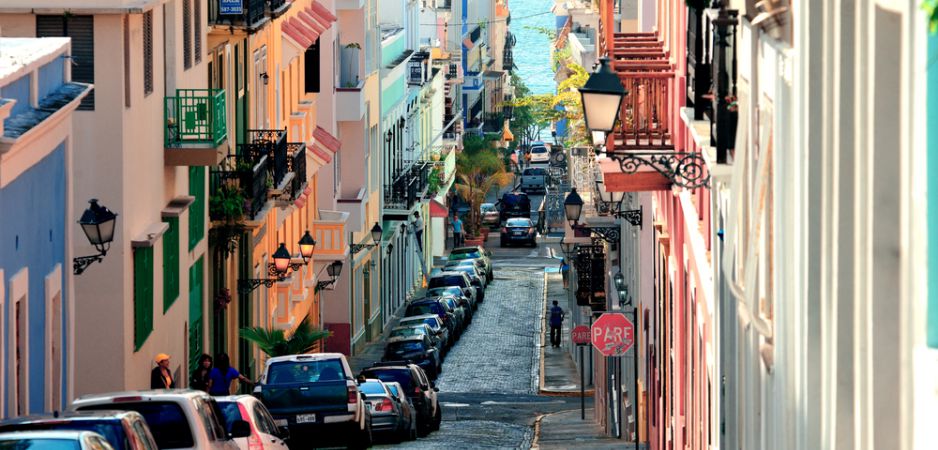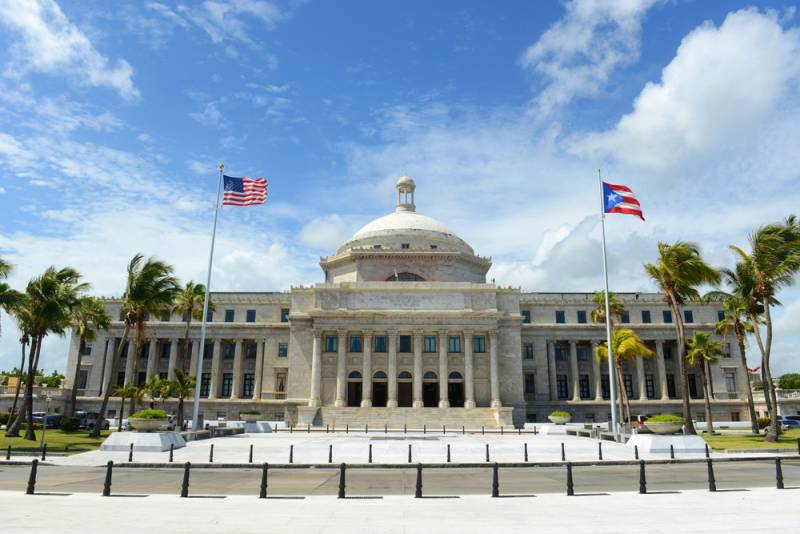With Puerto Rico likely to default on its debt, protection under US bankruptcy laws could help contain the resulting chaos.
As Puerto Rico braces for a debt default on August 1 and is being dubbed as “America’s Greece,” it is also staring at a long list of all that went wrong over the last 40 years or more. Best known for its tourism attractions of beaches, waterfalls and rain forests, the Caribbean island finds itself paying for decades of ill-designed labor laws and ineffective institutional mechanisms, among other constraints. Puerto Rico badly needs bankruptcy protection to contain the chaos that its default could bring about, along with longer-term structural reforms on multiple fronts, experts say.
Employers find Puerto Rico’s minimum wage of $7.25 an hour uncompetitive, which discourages job creation in the formal sector. Liberal welfare programs also discourage people from taking jobs in the formal sector. Instead, they seek employment within the informal sector, where workers stay below the radar of labor statisticians and tax collectors. The phasing-out in 2005 of tax incentives for US businesses investing in Puerto Rico also dampened job creation in recent years. Much damage is also attributed to decades of inadequate institutional structures and mechanisms for tax collection, lack of ease in doing business, difficulties in registering property and maritime trade constraints.
All those problems seemed to converge when, earlier in July, Puerto Rico’s Public Finance Corporation failed to transfer $93.7 million to pay principal and interest obligations on its bonds. With $72 billion in debt, the territory’s immediate problem is it cannot file for protection under US bankruptcy laws. Chapter 9 of the US Bankruptcy Code provides protection to municipalities and helps them restructure their debt. But unlike Detroit or Stockton, California, which are among the cities that have filed for Chapter 9 bankruptcy protection in recent years, Puerto Rico is not considered a state or a municipality under US federal laws.
The Key Issues
“Without Chapter 9 [protection], every creditor could go to court and it will be a like a bank run,” said Anne O. Krueger, senior research professor of international economics at Johns Hopkins University’s School of Advanced International Studies.
The “most pressing” need is to work out some way to help the island deal with the fallout of a debt default, according to Frank H. Shafroth, director of George Mason University’s Center for State and Local Government Leadership. He called for a process to ensure that critical public services are not interrupted, with a federal judge overseeing the effort. “[Or else], you’re going to have chaos,” he said. Shafroth has strong family ties with Puerto Rico. His great-grandfather, Senator John Shafroth, was instrumental in drafting the 1917 Jones-Shafroth Act, which granted Puerto Ricans US citizenship.
Puerto Rico needs “new institutions, new structures, new laws and new incentives,” according to Rosario Rivera-Negron, senior economist and economics professor at the University of Puerto Rico. “Without economic activity, there are not going to be any revenues, and we have seen that the fiscal crisis is feeding on the economic crisis—so we have to tackle both,” she said.
Krueger, Shafroth and Rivera-Negron discussed Puerto Rico’s underlying economic problems and suggested ways to revive growth on the Knowledge@Wharton show on Wharton Business Radio.
A History of Wrong Steps
How did Puerto Rico come to such a sorry pass? “Everybody is somewhat at fault,” said Krueger of Puerto Rico’s problems. The situation in Puerto Rico built up over several years, with the country running fiscal deficits and running down its cash balances, said Krueger. Now the island has exhausted all of its options to cope with its high debt levels, she added. Krueger co-authored a June 2015 report titled, “Puerto Rico: A Way Forward.”
Krueger noted that Puerto Rico has attempted to resolve its debt over the years, but none of those initiatives have worked. Excess expenditures and an inability “for a variety of reasons” to collect taxes compounded the damage, she added. According to Krueger, the fault also lies with the US, as Puerto Rico is not a state or a country and has fewer options than the 50 US states that could file for bankruptcy protection.
“Puerto Rico has not had any growth for 20 years,” said Krueger, noting two big setbacks the territory faced in that period. The removal in 2005 of tax exemptions on profits of US businesses investing in Puerto Rico was “significant,” she noted, and called upon US lawmakers “to do something” to bring back the enthusiasm among businesses to invest in the territory. Soaring oil prices between 2002-08 also hurt the island’s economy badly. Puerto Rico is heavily dependent on oil for its power, and high oil prices raised the costs of its electric company “unbelievably,” she said.
Rivera-Negron noted that Puerto Rico had not adequately heeded “several warnings since the 1970s that somewhere in the future, [its] economy will face what it is facing right now.” The island’s government failed to introduce structural reforms and its economic model relied too heavily on the so-called Section 936 of the US Internal Revenue Code that granted tax-free income for US businesses investing in its economy, she added. “Somewhere along the way, we were going to fail miserably, and we just did.”
Discouraging Work, Encouraging Welfare
According to Shafroth, Puerto Rico failed in trying to establish an effective tax system, thereby limiting benefits for its people. “Right now, unemployment benefits for people make not working more attractive than working for the wages that are available for most people in the territory,” he said. “In effect, you have a government policy that tends to discourage work and encourage spending.”
Krueger’s report has telling details on the impact of Puerto Rico’s labor and wage laws. “Only 40% of the adult population—versus 63% on the U.S. mainland—is employed or looking for work; the rest are economically idle or working in the grey [i.e. informal] economy,” it stated. The report cites two reasons for that situation. One, employers are disinclined to hire workers because the US federal minimum wage is very high relative to the local average, and two, local regulations pertaining to overtime, paid vacation and dismissal are costly and more onerous than on the US mainland.
“Workers are disinclined to take up jobs because the welfare system provides generous benefits that often exceed what minimum wage employment yields,” the report continued. It cites one estimate that a household of three eligible for food stamps, Medicaid and utilities subsidies could receive $1,743 per month, as compared to a minimum-wage earner’s take-home earnings of $1,159. “The result of all of the above is massive underutilization of labor, foregone output, and waning competitiveness,” the report said.
Finding Solutions
The political parties that have run the territory’s government over the past 25 years have failed to bring “a credible economic plan and the reformulation of the [existing] economic model,” Rivera-Negron said.
Among other things, Krueger pointed to tourism as an opportunity for Puerto Rico “if they can get their policies domestically and with the mainland sorted out.” She noted that the territory has several “attractive features” such as an English-speaking workforce, an absence of passport requirements and the prevalence of US laws. Yet for price-sensitive families looking for vacations, it is not competitive with neighboring islands or Mexico, which have lower minimum wages, she said.
Rivera-Negron said that labor reforms should be a prime area for Puerto Rico as it finds a way out of its problems. “How do we create some kind of incentive to draw those people that are working as professionals [in the informal sector] or are not [employed] in jobs to the formal sector with proper incentives?” she asked. A solution to that problem would help the territory collect income taxes and other levies that it needs, she added.
In addition to reforms to promote business investment and job creation, the US Congress could also help lower the cost of living on the island, Rivera-Negron suggested. She pointed in particular to the so-called “cabotage” laws that deny the territory the full benefits of maritime trade. Under cabotage restrictions in US maritime law, only US-flagged ships can be used for cargo traveling between US mainland ports and Puerto Rican ports. Those opposed to such regulations say that Puerto Rico’s economy would benefit if foreign-flagged ships were also allowed to ply between US mainland ports and Puerto Rican ports.
*[This article was originally published by Fair Observer’s content partner, Knowledge@Wharton.]
The views expressed in this article are the author’s own and do not necessarily reflect Fair Observer’s editorial policy.
Photo Credit: Jiawangkun / Songquan Deng / Shutterstock.com
 We bring you perspectives from around the world. Help us to inform and educate. Your donation is tax-deductible. Join over 400 people to become a donor or you could choose to be a sponsor.
We bring you perspectives from around the world. Help us to inform and educate. Your donation is tax-deductible. Join over 400 people to become a donor or you could choose to be a sponsor.
Support Fair Observer
We rely on your support for our independence, diversity and quality.
For more than 10 years, Fair Observer has been free, fair and independent. No billionaire owns us, no advertisers control us. We are a reader-supported nonprofit. Unlike many other publications, we keep our content free for readers regardless of where they live or whether they can afford to pay. We have no paywalls and no ads.
In the post-truth era of fake news, echo chambers and filter bubbles, we publish a plurality of perspectives from around the world. Anyone can publish with us, but everyone goes through a rigorous editorial process. So, you get fact-checked, well-reasoned content instead of noise.
We publish 2,500+ voices from 90+ countries. We also conduct education and training programs
on subjects ranging from digital media and journalism to writing and critical thinking. This
doesn’t come cheap. Servers, editors, trainers and web developers cost
money.
Please consider supporting us on a regular basis as a recurring donor or a
sustaining member.
Will you support FO’s journalism?
We rely on your support for our independence, diversity and quality.








Comment